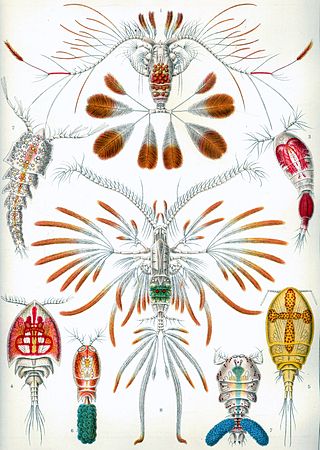| Aetideidae | |
|---|---|
| Scientific classification | |
| Domain: | Eukaryota |
| Kingdom: | Animalia |
| Phylum: | Arthropoda |
| Class: | Copepoda |
| Order: | Calanoida |
| Family: | Aetideidae Giesbrecht, 1892 |
Aetideidae is a family of copepods belonging to the order Calanoida. [1]
| Aetideidae | |
|---|---|
| Scientific classification | |
| Domain: | Eukaryota |
| Kingdom: | Animalia |
| Phylum: | Arthropoda |
| Class: | Copepoda |
| Order: | Calanoida |
| Family: | Aetideidae Giesbrecht, 1892 |
Aetideidae is a family of copepods belonging to the order Calanoida. [1]
The family contains the following genera: [2]

Siphonostomatoida is an order of copepods, containing around 75% of all the copepods that parasitise fishes. Their success has been linked to their possession of siphon-like mandibles and of a "frontal filament" to aid attachment to their hosts. Most are marine, but a few live in fresh water. There are 40 recognised families:

Calanidae is the largest taxonomic family of calanoid copepods. It includes the genus Calanus, which may be the most abundant metazoan genus on Earth.

Canthocamptidae is a family of copepods. Most of the 700 species are confined to fresh water, although there are also marine species. It contains the following genera:

George Stewardson Brady was a professor of natural history at the Hancock Museum in Newcastle-upon-Tyne who did important volumes on Copepoda and Ostracoda, including those from the Challenger expedition.

Sapphirina, whose members are commonly known as sea sapphires, is a genus of parasitic copepods in the family Sapphirinidae.

Acartia is a genus of marine calanoid copepods. They are epipelagic, estuarine, zooplanktonic found throughout the oceans of the world, primarily in temperate regions.

Wilhelm Giesbrecht (1854–1913) was a Prussian zoologist, specialising in copepods, during the "golden age of copepodology".
Centropagidae is a family of copepods in the order Calanoida. Its members are particularly known as plankton in coastal waters and in fresh water in Australia and southern South America. They are also found on subantarctic islands and in lakes in Antarctica.
Phaennidae is a family of planktonic copepods, found in pelagic or benthopelagic waters. It contains the following genera:

Pontella is a marine copepod genus in the family Pontellidae. It is an organism that bears three lenses in the eye. The outer has a parabolic surface, countering the effects of spherical aberration while allowing a sharp image to be formed.

Euaugaptilus is a genus of copepods. The genus contains bioluminescent species.
Augaptilidae is a family of copepods.

Mormonillidae is a family of planktonic marine copepods, the only member of the order Mormonilloida. There are five known species in two genera:

Artotrogidae is a family of copepods in the order Siphonostomatoida.

The clade Multicrustacea constitutes the largest superclass of crustaceans, containing approximately four-fifths of all described crustacean species, including crabs, lobsters, crayfish, shrimp, krill, prawns, woodlice, barnacles, copepods, amphipods, mantis shrimp and others. The largest branch of multicrustacea is the class Malacostraca.

Eurytemora is a genus of copepods in the family Temoridae. The World Register of Marine Species lists the following species:

Euchaetidae is a family of marine copepods. The family is cosmopolitan and occurs in all the oceans, including the Southern and Arctic Oceans. Euchaetidae are medium to large-sized copepods.
Heterorhabdidae is a family of copepods belonging to the order Calanoida.
Arietellidae is a family of copepods belonging to the order Calanoida.
Clausocalanidae is a family of copepods belonging to the order Calanoida.